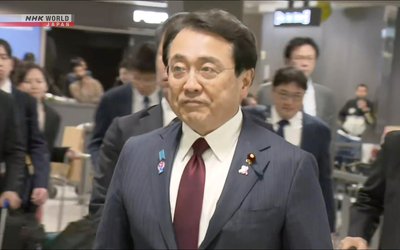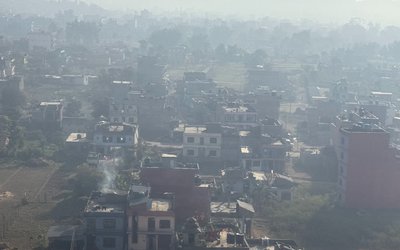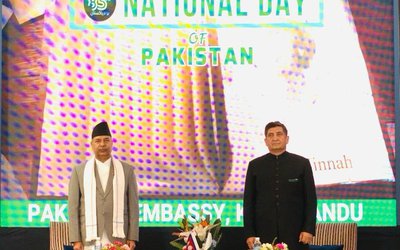Expectedly, lawmakers representing opposition CPN UML stalled proceeding in both houses of the Parliament on the first day (September 8) of the new session, accusing Speaker Sapkota of being a part of the conspiracy to split their party. They are raising the issue of ordinance that amended the Political Party Act, which facilitated a split in UML and Janata Samajbadi Party-Nepal (JSP-N) by lowering the threshold for splitting parties from 40 percent support both in the central committee and parliamentary party to 20 percent support in any one of the two bodies of a party. They also blame Sapkota for engineering the split in their party by not confirming the expulsion of 14 lawmakers who, along with some others from both houses, ultimately created Unified CPN Samajbadi (CPN Samajbadi) under the leadership of Madhav Nepal. On the first day of the session, house meetings were fruitlessly postponed several times to diffuse the tense situation. Probably concluding that the House unrest would not recede soon, government in consultation with Speaker decided to push the important business ahead. Consequently, Political Party Act (Second Amendment) was tabled amid sloganeering by UML lawmakers. Likewise, Minister of Finance Janardan Sharma presented the Replacement Bill, in place of ordinance budget, in the noisy second meeting of the House on September 10. Ignoring the noise, majority members of the House passed on September 20 the Appropriation Bill tabled by Sharma. Despite the strong verbal and physical unrest shown in the House by the concerned, most observers find it a mere continuation of what parties in opposition have been doing in the House in the last couple of years. Even the slogans chanted against the ordinance put forth by Deuba-led government are more or less a repetition of what was expressed by Nepali Congress (NC) lawmakers against similar acts of Oli. Oli failed in splitting a Madesh-based party but Deuba succeeded in splitting Oli-led UML, paving way for Madhav Nepal to create and head a new party and also helped Mahanta, who was finding himself in an uncomfortable position with majority of lawmakers in the party eventually deciding to support his arch rival Upendra Yadav, who in the changed context became the legitimate head of the parent party-JSP-N. This way, Deuba succeeded in appeasing both. He also got the Political Party Act (Second Amendment) Ordinance rescinded by the President on September 27, mainly to check the apprehended split, after cabinet expansion, in JSP-N. Call it use or misuse of ordinances, point to be noted is that while Oli made two separate attempts and succeeded only once, in getting his people appointed in various constitutional bodies,Deuba’s very first attempt was successful.
Indeed, parties seem to be taking turn in sloganeering in the House, opposing different acts of those in power. It seemed UML lawmakers were just impatient to grab the first opportunity available to come down aggressively on the government and the Speaker, after being deprived of the opportunity to perform the opposition role for more than three years when NC and other opposition parties performed this House ritual, albeit less aggressively. Indeed, NC parliamentarians could be no match for UML lawmakers in turning the House situation fearful and chaotic. Equally interesting was to see complete absence of gender gap in the display of physical aggression in the House on September 10. While one female lawmaker was seen using a security personnel deployed there as a ladder to reach the stage, another regretted later to the press that she could not physically harm Speaker Sapkota and Finance Minister Sharma, despite attempt. Very pleasantly, however, the Appropriation Bill was passed by both houses of the Parliament and was authenticated on September 23 by President Bhandari. It is gratifying that the unexpectedly quick passage of the bill ended the budget holiday witnessed since September 15.
UML leadership seems to have charted a pragmatic course of letting the government proceed with sensitive and important businesses, while continuing with the protest in the House as well as outside. In fact, there is no much sense in opposing the new budget which, according to Finance Minister Sharma himself, is not different from the ordinance budget of UML presented earlier. Size of the budget has been reduced by a mere Rs. 15 billion to Rs. 1632 billion. No major change in other budgetary heads is seen as capital and recurrent expenditures have remained more or less unchanged. Revenue collection target has been hiked a bit and public debt, both external and internal, has been justifiably reduced. It may be noted that this budget has not only retained the increase in social security allowances provided earlier but has included some more measures such as provisions for the family of martyrs killed during political movements, for patients suffering from serious ailment and a one-time grant of Rs. 10000 to half a million poor households that have lost their sources of income on account of the pandemic. It seems Sharma has decided to concentrate more on the implementation side, which has been lacking so far. Growth target, however, has been hiked to 7 percent from 6.5 percent, which many think, including multilateral agencies, is difficult to achieve, given the state of the economy hard hit by Covid-19.
Data made available for the two months of this fiscal year (2078\79) do not present an encouraging picture in that capital expenditure during the period has been less than 1 percent of the allocated amount and 0.46 percent less than what was expended during the same period a year earlier. Remittance inflow has turned negative in the first month of this fiscal year and so is the position of BOP,whics has gone negative by more than Rs. 38 billion.Likewise,trade imbalance has further deteriorated during this period. Last fiscal year was also not a good period in that trade deficit (Rs.1389 billion) registered an annual increase of more than 27 percent, which was about RS.200 billion more than the total budgetary expenditure (Rs. 1180 billion) incurred that year. Another disturbing factor in our economy has been the rising public debt over time, which many assert, has not been productively used and last fiscal year it reached Rs. 1729 billion, exceeding the budgetary outlay by more than Rs. 250 billion. It may be noted that public debt constituted less than 76 percent of the annual budget of Rs. 819 billion some five years ago. Many observers feel that increasing debt and trade deficit are the two serious problems of our economy, which have jointly contributed to a deterioration in the purchasing power of our currency. Very disturbing is also the recent sharp drop, by Rs.45 billion in one month, in foreign exchange reserve due basically to increase in imports and decrease in remittances. Last fiscal year was also not an encouraging year from several other angels such as decreased level of balance of payment (BOP) surplus, decreased level of foreign investment inflow and the left government failing one more time to collect the targeted revenue. Some solace, however, was provided by remittances from Nepalis outside, which registered an increase of 9.8 percent compared to a year earlier level when it had decreased by 0.5 percent. Exports in the first two months of the current fiscal year have gone up by 115 percent as against an increase of 76 percent in Nepal’s import during the period. Our major export items such as soya bean oil and palm oil, however, solely depend on import of respected raw oils from outside and are exported without significant value addition. It is interesting that these two edible oils and their crude forms appear as major items on export and import fronts respectively. Indeed, concerted efforts will have to be made to achieve a growth of more than 4.1 percent, lately predicted by the Asian Development Bank, this year. A lot is also contingent upon the state of political situation in the country and government’s success in controlling the devastating pandemic. Nepal does not look politically stable with UMl protesting to pave way for early polls and Deuba not being able to expand his Cabinet so far.
Despite a very strong majority in the Parliament, Nepal did not remain politically stable during Oli’s rule of more than three years. It looked like he had to allocate more time to handle intra-party problems than nation building activities. The intra-party wrangling snowballed into serious political problems, creating a situation for other political parties to extend a helping hand to those agitating against Oli in the party. It’s unfortunate, especially for Oli and his party that they are out of power not only at the center but have already lost power in Gandaki and Lumbini and two more governments (Province- 1 and Bagmati) are destined to collapse soon. It would also be equally interesting to watch how Oli handles leaders, who were with rival faction leader Madhav Nepal but sided with Oli when Nepal opened a new party. Initial indications are that Oli is in no mood to assign key responsibility to these leaders and some of the leaders have begun to accuse him of not being sincere in the implementation of the 10-point unity proposal that these leaders had given commendable inputs to. Probably to ease the pain of losing power, Oli and his followers blame Prachanda and Madhav Nepal for the debacle they have suffered, but it would be wise for them to spend some time introspecting before embarking upon another course of action. It is natural for Oli to wish early polls not only because he dissolved the House twice for the purpose but more so because he wants his party to get into it before it suffers further erosion over time. On the contrary, Madhav Nepal wants some time to consolidate his newly formed party’s position before jumping into the polls and would definitely do everything possible to have an electoral adjustment\agreement with his partners in the current coalition government. With his relatively untarnished image and solid contribution in pushing ahead the left movement, Madhav Nepal represents a force to reckon with in Nepal and is expected to help Deuba discharge his responsibility properly till the end of the current tenure of the Parliament. For now, let us hope that Prime Minister Deuba, who has displayed tons of patience and shown flexibility of all kind in running difficult coalition governments in the past, does not let his patience wear thin this time around and gives adequate attention to our serious economic problems so that he could show to the people that he is also a better manager of the economy than most other prime ministers.

Dr. Tilak Rawal
Dr. Rawal is former governor of NRB.
- Six Months Of Deuba And Oli
- Jan 25, 2025
- Prachanda Outsmarted
- Jul 19, 2024
- Prachanda Outsmarts Again
- Apr 14, 2024
- Prachanda Completes One Year
- Jan 26, 2024
- Terrible Times To Continue
- Oct 12, 2023













